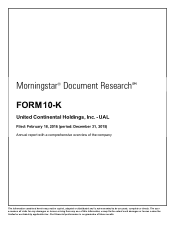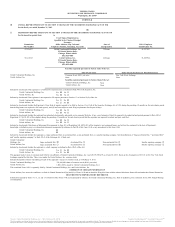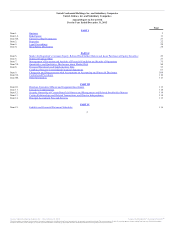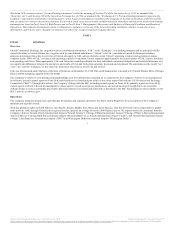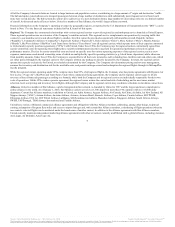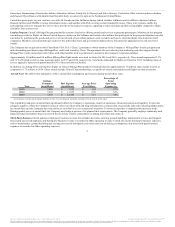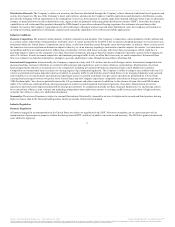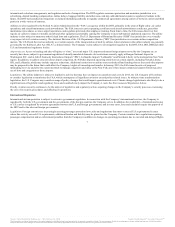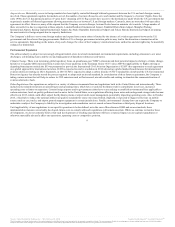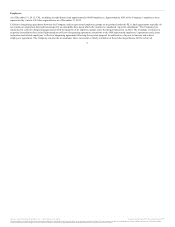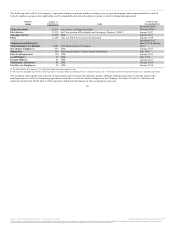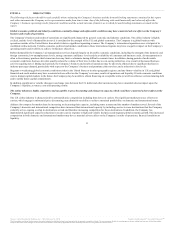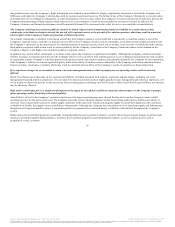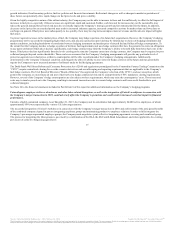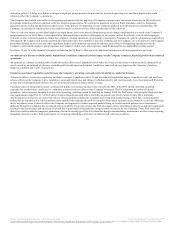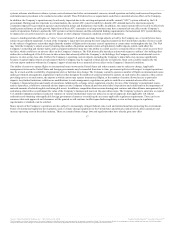United Airlines 2015 Annual Report Download - page 8
Download and view the complete annual report
Please find page 8 of the 2015 United Airlines annual report below. You can navigate through the pages in the report by either clicking on the pages listed below, or by using the keyword search tool below to find specific information within the annual report.
international codeshare arrangements, and regulates methods of competition. The DOT regulates consumer protection and maintains jurisdiction over
advertising, denied boarding compensation, tarmac delays, baggage liability and other areas, and may add additional expensive regulatory burdens in the
future. The DOT has launched investigations or claimed rulemaking authority to regulate commercial agreements among carriers or between carriers and third
parties in a wide variety of contexts.
Airlines are also regulated by the Federal Aviation Administration (the “FAA”), an agency within the DOT, primarily in the areas of flight safety, air carrier
operations, and aircraft maintenance and airworthiness. The FAA issues air carrier operating certificates and aircraft airworthiness certificates, prescribes
maintenance procedures, oversees airport operations, and regulates pilot and other employee training. From time to time, the FAA issues directives that
require air carriers to inspect or modify aircraft and other equipment, potentially causing the Company to incur substantial, unplanned expenses. The airline
industry is also subject to numerous other federal laws and regulations. The U.S. Department of Homeland Security (“DHS”) has jurisdiction over virtually
every aspect of civil aviation security. The Antitrust Division of the U.S. Department of Justice (“DOJ”) has jurisdiction over certain airline competition
matters. The U.S. Postal Service has authority over certain aspects of the transportation of mail by airlines. Labor relations in the airline industry are generally
governed by the Railway Labor Act (“RLA”), a federal statute. The Company is also subject to investigation inquiries by the DOT, FAA, DOJ, DHS and other
U.S. and international regulatory bodies.
Access to landing and take-off rights, or “slots,” at several major U.S. airports and many foreign airports served by the Company are, or
recently have been, subject to government regulation. Federally mandated domestic slot restrictions currently apply at Reagan National Airport in
Washington D.C., and at John F. Kennedy International Airport (“JFK”), LaGuardia Airport (“LaGuardia”) and Newark Liberty in the metropolitan New York
region. In addition, to address concerns about airport congestion, the FAA has imposed operating restrictions at certain airports, including Newark Liberty,
JFK, and LaGuardia, which may include capacity reductions. Additional restrictions on airline routes and takeoff and landing slots at these and other airports
may be proposed in the future that could affect the Company’s rights of ownership and transfer. In January 2015, the FAA issued a notice of proposed
rulemaking to revise and alter the current methods to manage congestion and delay at the New York area’s three major commercial airports which may alter
use of slots and congestion at those airports.
The airline industry is subject to legislative activity that may have an impact on operations and costs. In 2016, the U.S. Congress will continue
to consider legislation to reauthorize the FAA, which encompasses all significant aviation tax and policy-related issues. As with previous reauthorization
legislation, the U.S. Congress may consider a range of policy changes that could impact operations and costs. Climate change legislation is also likely to be a
significant area of legislative and regulatory focus and could adversely impact the Company’s costs. See , below.
Finally, aviation security continues to be the subject of legislative and regulatory action, requiring changes to the Company’s security processes, increasing
the cost of its security procedures, and affecting its operations.
International Regulation
International air transportation is subject to extensive government regulation. In connection with the Company’s international services, the Company is
regulated by both the U.S. government and the governments of the foreign countries the Company serves. In addition, the availability of international routes
to U.S. carriers is regulated by aviation agreements between the U.S. and foreign governments, and in some cases, fares and schedules require the approval of
the DOT and/or the relevant foreign governments.
Foreign countries are increasingly enacting passenger protection laws, rules and regulations that meet or exceed U.S. requirements. In cases
where this activity exceeds U.S. requirements, additional burden and liability may be placed on the Company. Certain countries have regulations requiring
passenger compensationand/or enforcement penalties from the Company in addition to changes in operating procedures due to canceled and delayed flights.
7
Source: United Continental Holdings, Inc., 10-K, February 18, 2016 Powered by Morningstar® Document Research℠
The information contained herein may not be copied, adapted or distributed and is not warranted to be accurate, complete or timely. The user assumes all risks for any damages or losses arising from any use of this information,
except to the extent such damages or losses cannot be limited or excluded by applicable law. Past financial performance is no guarantee of future results.

